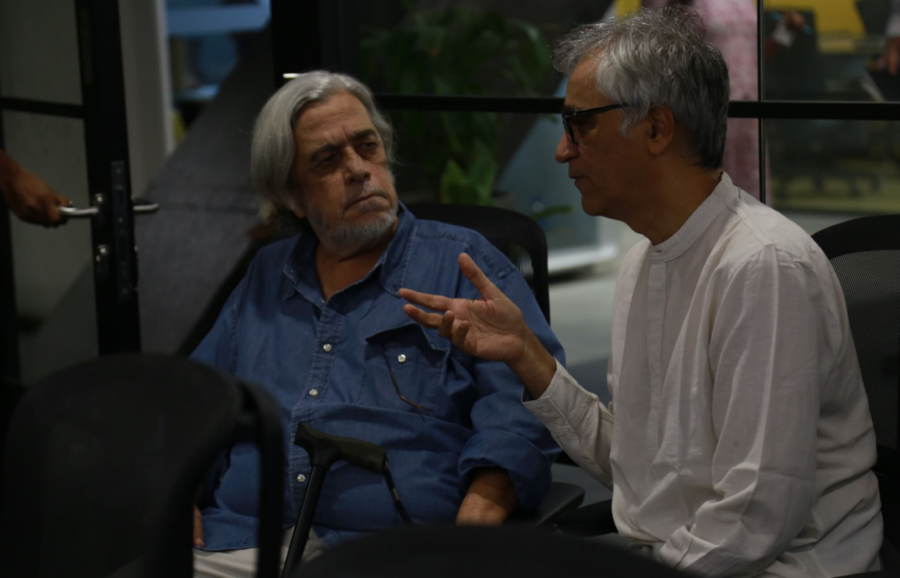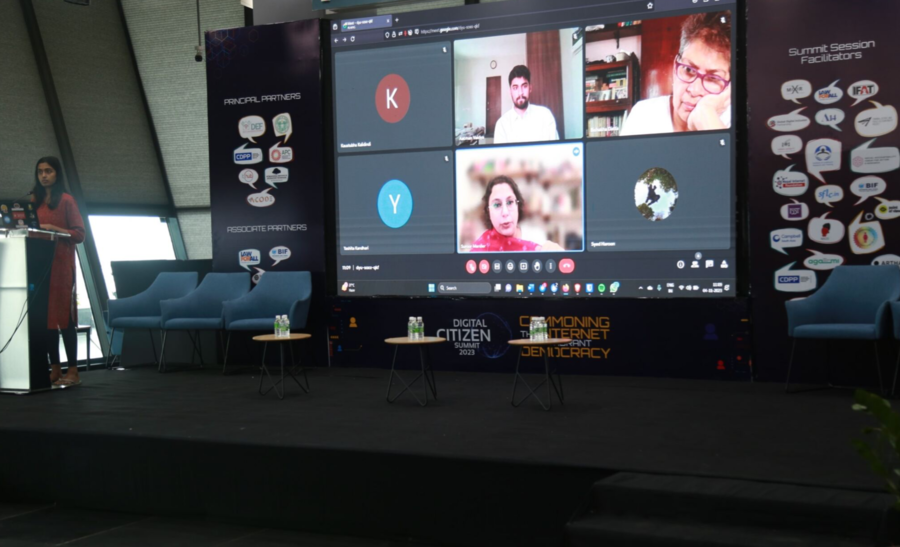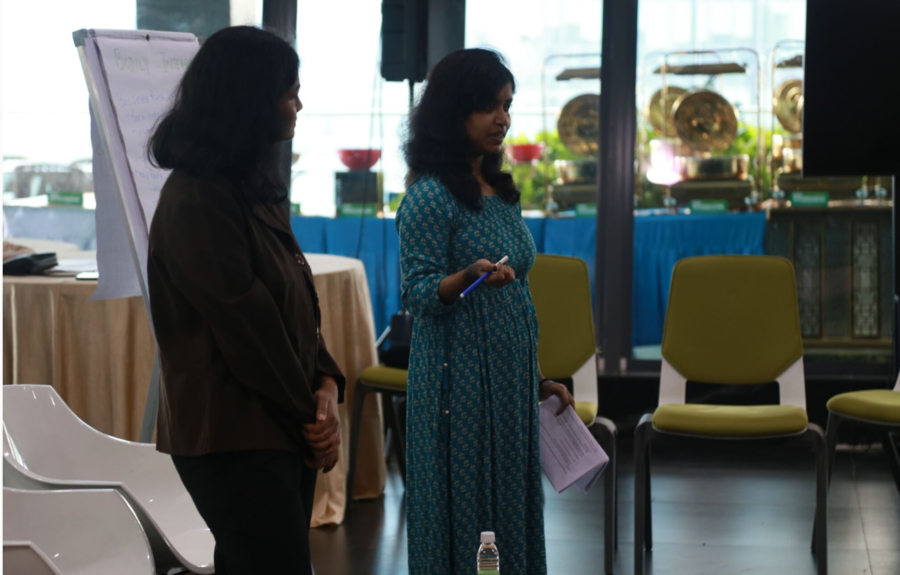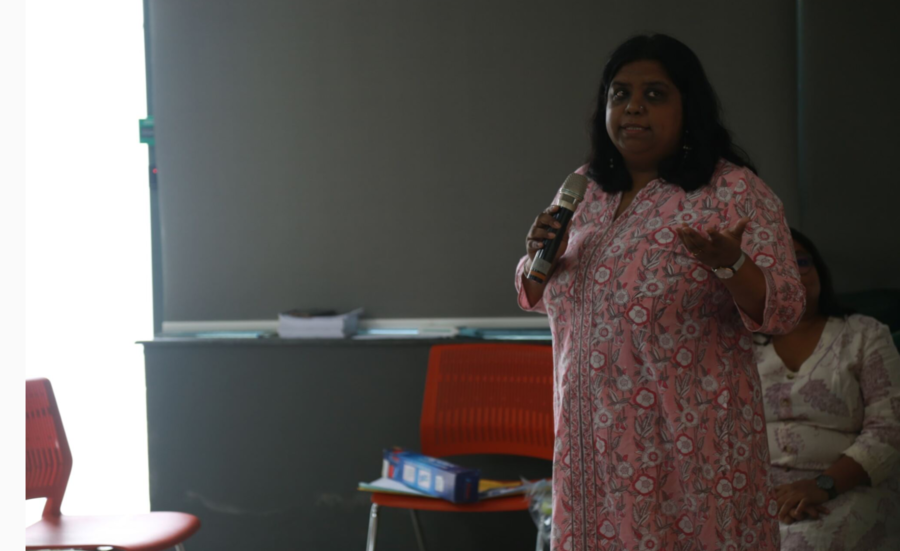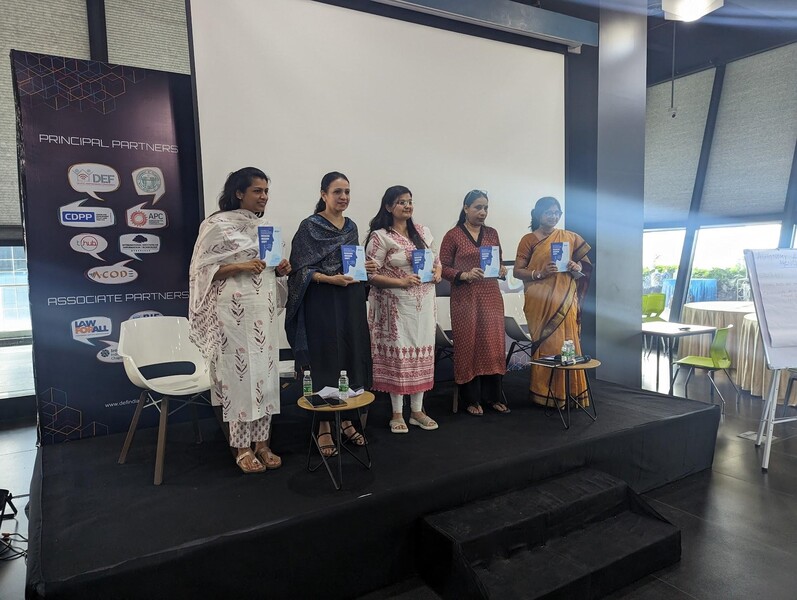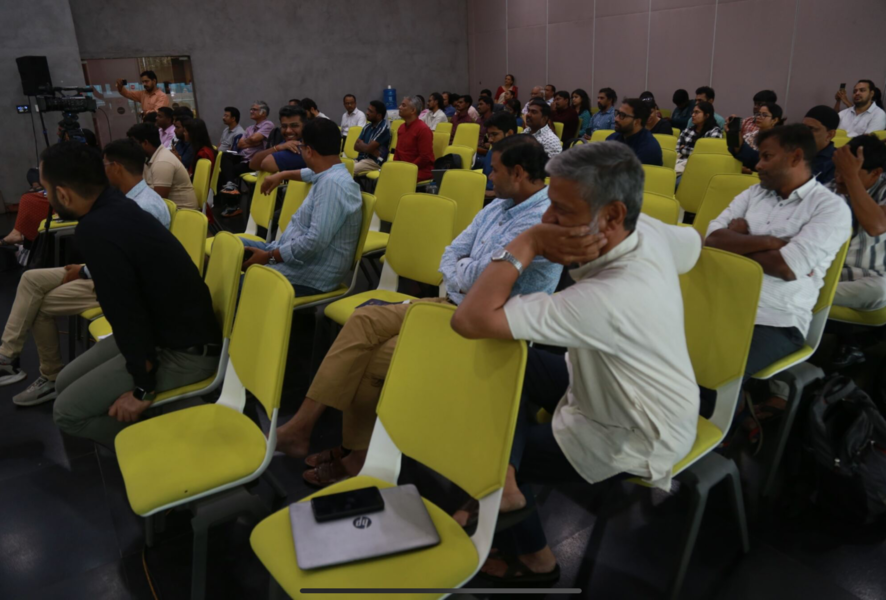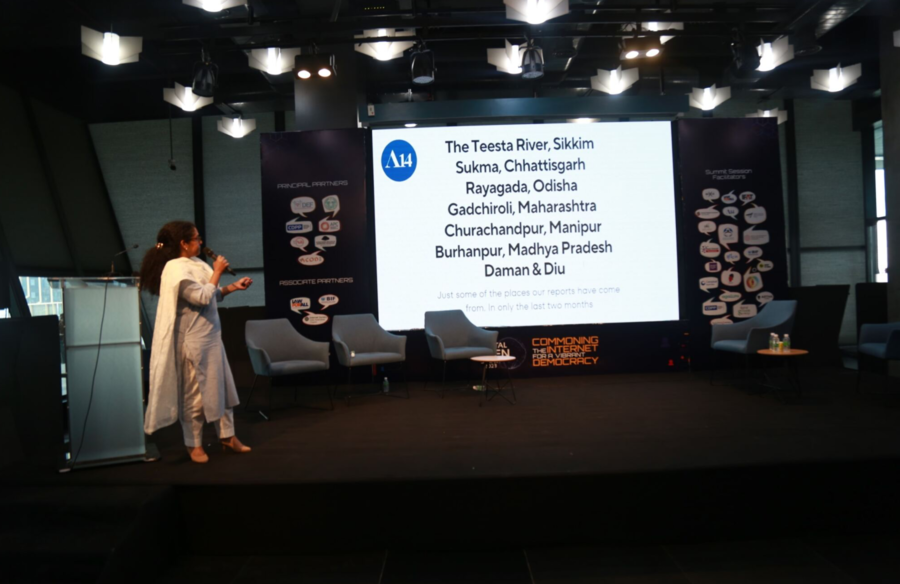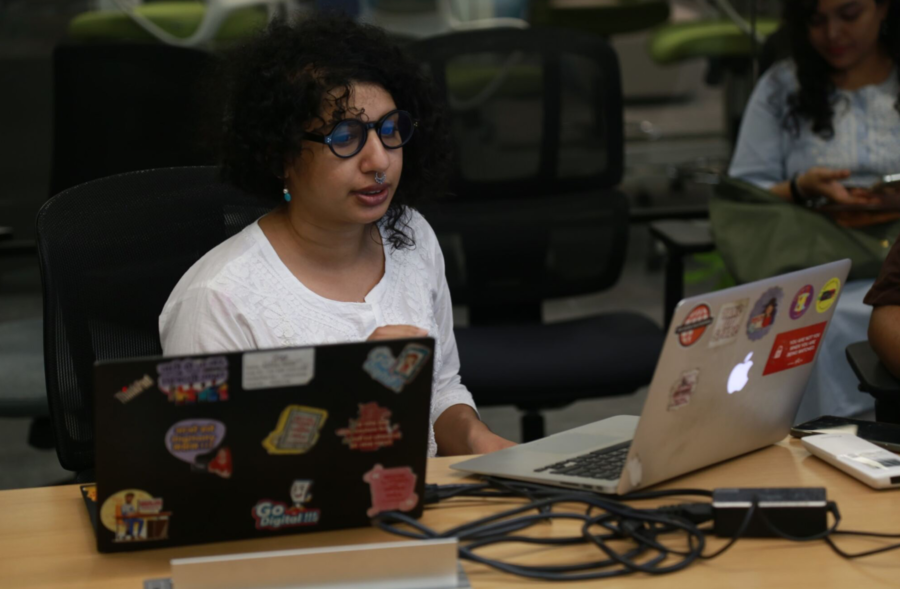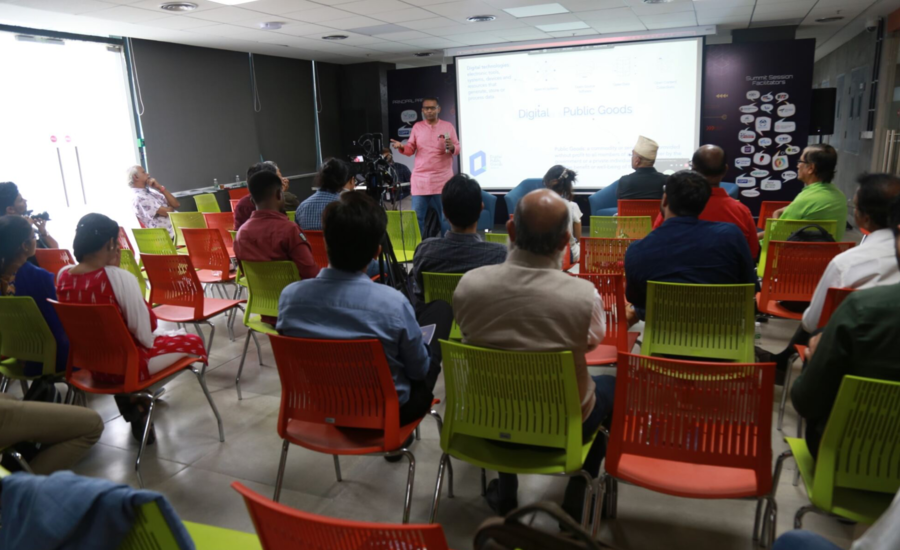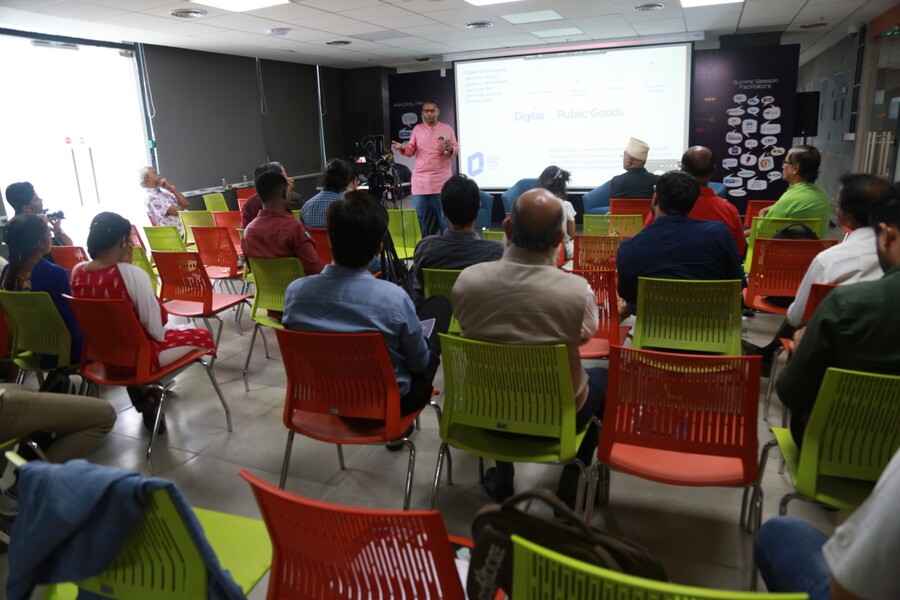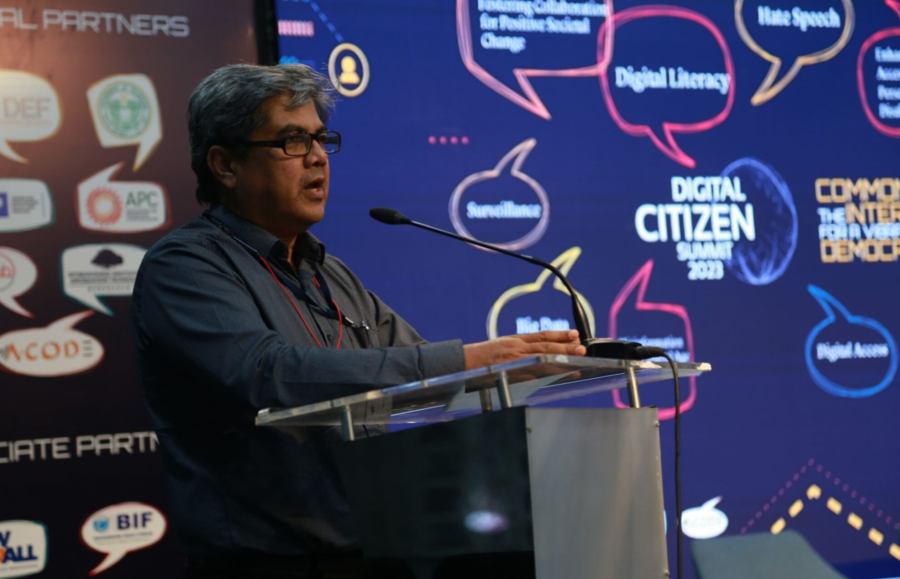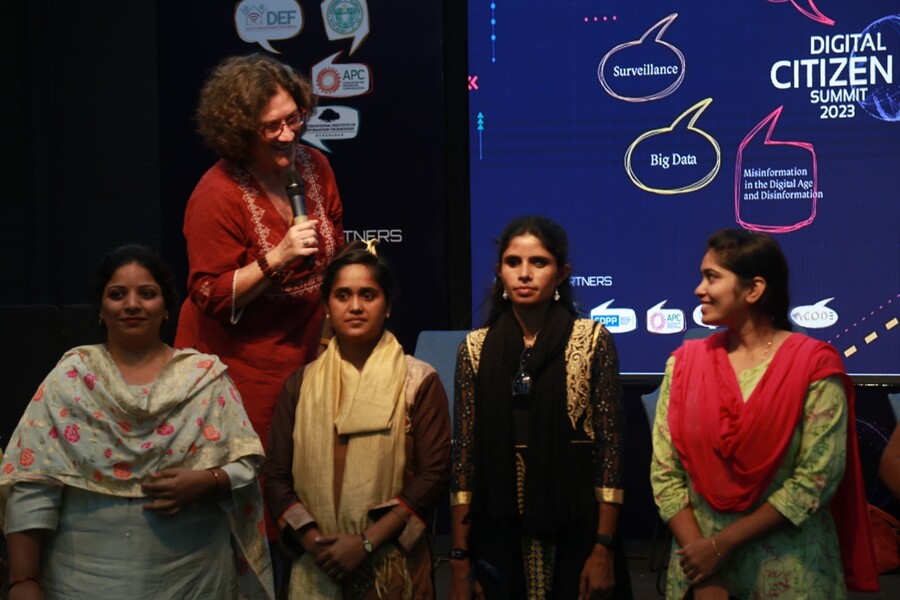Day 2: 3rd November, 2023
PANEL DISCUSSIONS
Welcome Note by Dr. Amir Ullah Khan Research Director, Centre for Development Policy & Practice (CDPP)
The Digital Citizen Summit commenced with Dr. Amir Ullah Khan, the Research Director at the Centre for Development Policy and Practice, setting the stage with a warm welcome and contextualizing the summit at the opening session. He emphasised that the aim of the summit was to discuss the issues around digitization and citizenship; the issues that gravely concern the country today.
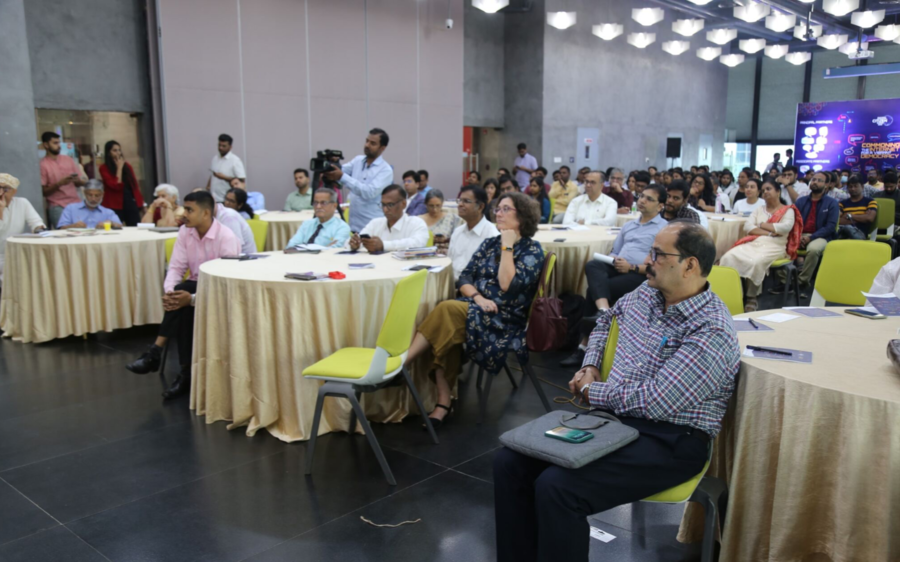
Keynote Address by Chief Guest, Mr. Shri Jayesh Ranjan, lAS Principal Secretary, Department of Information Technology, Electronics & Communications (ITE&C) and Department of Industries & Commerce
The Keynote Address that followed was delivered by Mr. Jayesh Ranjan, Principal Secretary of the Department of Information Technology, Electronics & Communications (ITE&C), and Department of Industries & Commerce, Government of Telangana, from 10:05 AM to 10:15 AM.
He delved into the initiatives that the Government of Telangana has taken to use digital technologies to reduce the day-to-day inefficiencies of the disadvantaged factions of Telangana, especially in agriculture.

A Plenary Session on the theme “Commoning the Internet for a Vibrant Democracy”
Panelists:
Mr. Shri Jayesh Ranjan, IAS Principal Secretary, Department of Information Technology, Electronics & Communications (ITE&C) and Department of Industries & Commerce,
Ms. Sonia Jorge Executive Director, Global Digital Inclusion Partnership
Dr. Shiv Kumar Principal Advisor, Broadband India Forum
Mr. Nikhil Dey, Founding Member, Mazdoor Kisan Shakti Sangathan
Mr. Kunal Kamra, Stand Up Comedian
Ms. Kavita Iyer, Editor, Article 14
Moderated by Osama Manzar, Founder-Director, Digital Empowerment Foundation

This set the tone for the day, paving the way for the Inaugural Plenary Session, which had eminent panelists speaking on this year Summit’s central theme of ‘Commoning the Internet for a Vibrant Democracy.’ The session, held from 10:15 AM to 11:30 AM, featured prominent speakers, including Mr. Jayesh Ranjan, Ms. Sonia Jorge, Dr. Shiv Kumar, Mr. Nikhil Dey, Mr. Kunal Kamra, and Ms. Kavitha Iyer. The discussion, moderated by Osama Manzar, Founder-Director of Digital Empowerment Foundation, delved into how the world is becoming increasingly digitised, and that we are all forced to become digital citizens. Given this situation, how do we build an inclusive and equal digital future for all?
The inaugural panel located digital citizenship in the democratic constitutional framework and re-instated that even in digital spaces if a citizen’s fundamental rights are violated, they should be able to approach the Supreme Court. Given the landscape of digitization in India, the policies that rely on digital architecture are moving faster than the connectivity in households. Consequently, when Aadhaar is made mandatory in schemes like MGNREGA or Aadhaar-based systems, it further excludes the marginalised population, especially women.
Even for those who have access to the internet when they come onto platforms like Instagram or YouTube, they would have to deal with community guidelines set by these corporations. These platforms lack independent bodies that fact-check and hence they rely on government orders, which means people on these platforms are subjected to control by private tech giants and governments.
Exhibition, Launch & Tea
Museum of Digital Society – Story of Digital Development in India Mr. Srinivas Rao Mahankali, CEO, T-Hub Smt. and Deepthi Ravula, CEO, WE-Hub
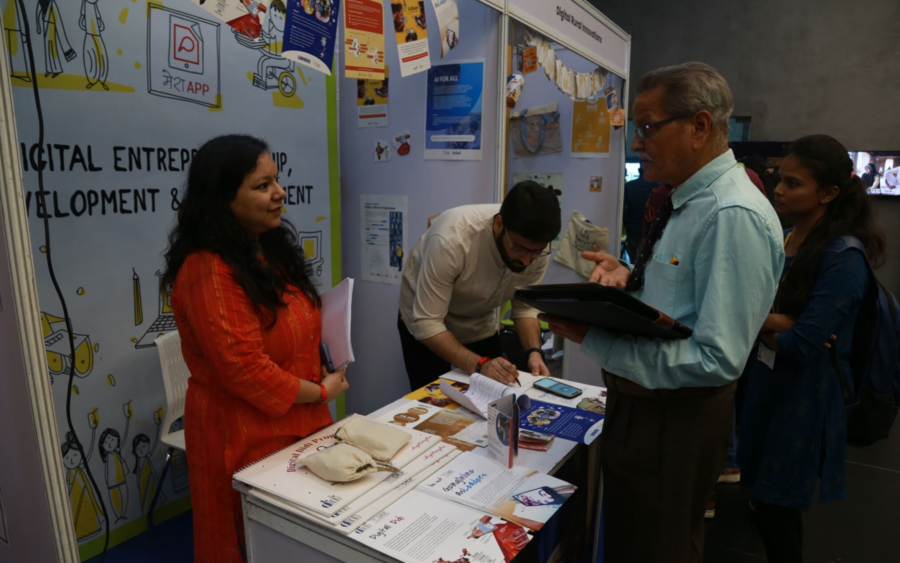
Following this enlightening plenary session, the Summit took a creative turn with the launch of the Museum of Digital Society and the unveiling of the ‘Story of Digital Development in India.’ Mr. Srinivas Rao Mahankali (CEO, T-Hub) took the stage, providing insights into the digital evolution as well as the tech and innovation ecosystem of Telangana. Tea was served as delegates and participants explored this innovative exhibition.
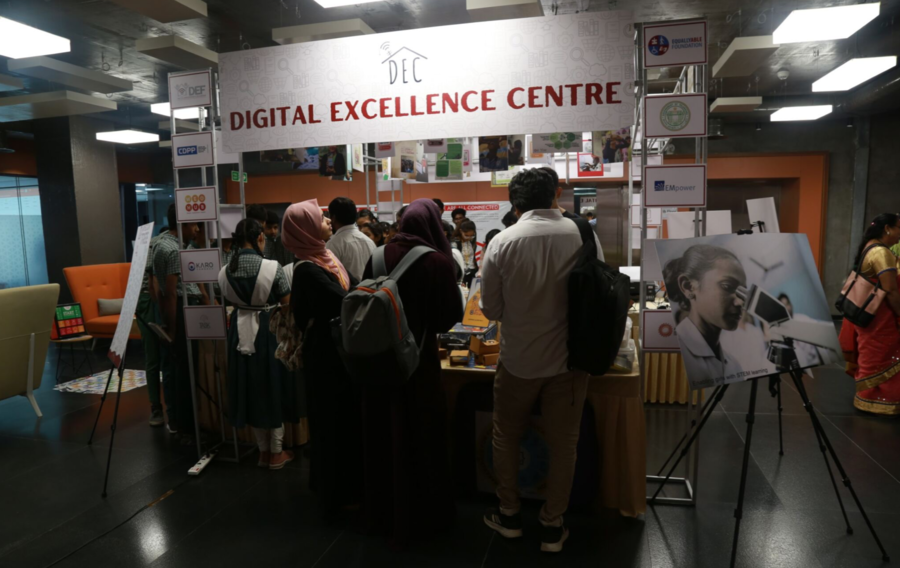
Following the launch of the exhibition, parallel sessions unfolded at four different locations within the venue, each offering a unique perspective(s) on digital rights and development.
Panel Discussion: ‘Going the Extra Mile’
By Broadband India Forum, Broadband India Forum (BIF) functions as an independent policy forum and think-tank that works for the development & enhancement of the entire broadband ecosystem in a holistic, technology-neutral, and service-neutral manner.
Panelists:
Dr. Sarat Chandra Babu, Chairman, BIF Committee on Cyber Security
Dr. Madhuri Dubey, Founder Director, National Skill Network
Mr. Rama Krishna Nelli, PGM (NGN), BBNW, BSNL Hyderabad
Mr. KK Thakur, Advisor, Global Cyber Peace Foundation and Ex-Chief General Manager, BSNL
Moderated by: Dr. T Hanuman Chowdary, Advisor Global Cyber Peace Foundation
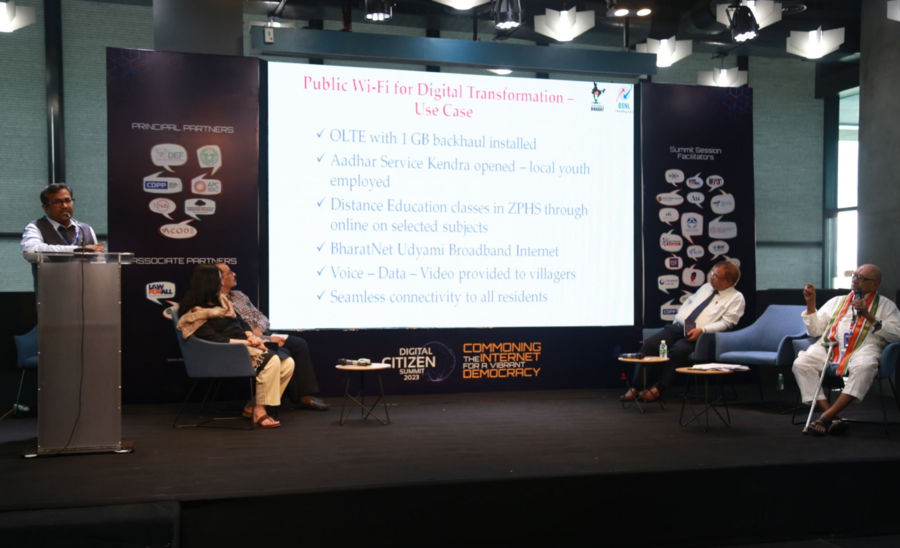
This session was about broadband connectivity in India, it presented statistics of how broadband connectivity has increased over the years but claimed that the figures were still lagging in an India that we imagine as digital. The session provided solutions on how broadband can become affordable in the country.
Today, the country can use broadband to help people in villages earn livelihoods and Common Service Centers, establishing such centers can help one person earn Rs. 25,000-35,000. This can also help solve the migrant crisis. We can also imagine digitally connected Self Help Groups (SHGs) like we have seen in China; this will help people gain market share and increase their networks.
Key outputs: We need broadband that is readily-available and affordable even though currently in India broadband’s costs are lowest. Broadband is paving a path for India to become an information and knowledge society. Broadband connectivity can also help in telemedicine, education, and crime control.
Panel Discussion: ‘Peeking into the Future of Development’
By Centre for Development Policy & Practice (CDPP)
Centre for Development Policy and Practice is an independent and non-partisan organisation working to influence public policy with a focus on the development of minorities. It is involved in research, advocacy, training, and outreach to disseminate its research findings.
Panelists:
Dr. Abdul Shaban, Professor, Tata Institute of Social Sciences, Mumbai Vijaya B Marisetty, Professor Fintech and Financial Analytics, University of Hyderabad
Dr. Anant Maringanti, Geographer, Urban Expert and Director, Hyderabad Urban Labs
Ms. Kalpana Ramesh, Founder, The Rainwater Project
Moderated by: Dr. Amir Ullah Khan, Research Director, Centre for Development Policy & Practice
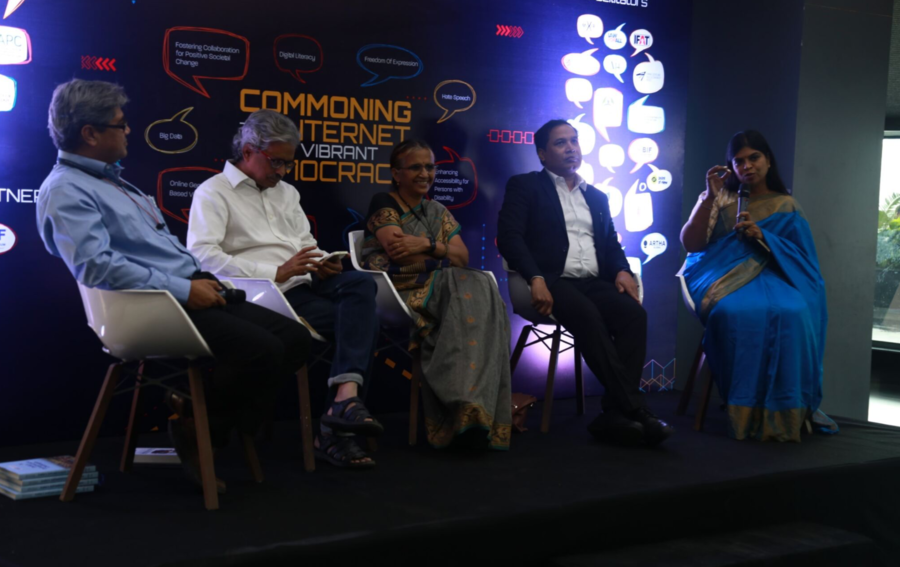
The conversation began by addressing the importance of understanding land use, water availability, and aquifers. Dr. Kalpana Ramesh emphasised the role of technology in grasping the basics of water availability and addressing mismanagement issues. Despite the substantial data collected by government departments, questions were raised about its practical impact and the potential for technology to bridge the gap between communities and research.
The discussion transitioned to urbanization concerns, highlighting the prioritization of modernity over the inherent nature of the land. Challenges in balancing development and environmental conservation were underscored, with Mr. Anant Maringanti stressing the need to invest in young minds exploring ways to overcome constraints for a better future.
The panel linked technology with democracy, emphasizing that easier access to information through digitization can enhance the democratic process. Infrastructure, including telephone lines and accessibility, was deemed essential for successful digitization. The session stressed the importance of the technology-democracy cycle, wherein information leads to knowledge, action, and empowerment, playing a pivotal role in the democratic process.
Key outputs: The discussions covered a spectrum of issues, from water scarcity and urbanization challenges to the role of digital technology and artificial intelligence in ensuring inclusive development. The key takeaway emphasised a holistic approach involving technology, democracy, public participation, and actionable steps to achieve desired development outcomes.
Workshop: ‘Why is Evidence Important?’
By Campbell South Asia Campbell South Asia is Regional Centre for the Campbell Collaboration. Campbell Collaboration’s National and Regional centres (NRCs) are responsible for promoting Campbell in their respective regions, encompassing activities like organising trainings, garnering media coverage, and publishing Campbell products.
Speakers:
Dr. Bhumika TV, Director General, Campbell South Asia
Dr. Swati Mantri, Consultant, Evidence Synthesis Specialist, Campbell South Asia
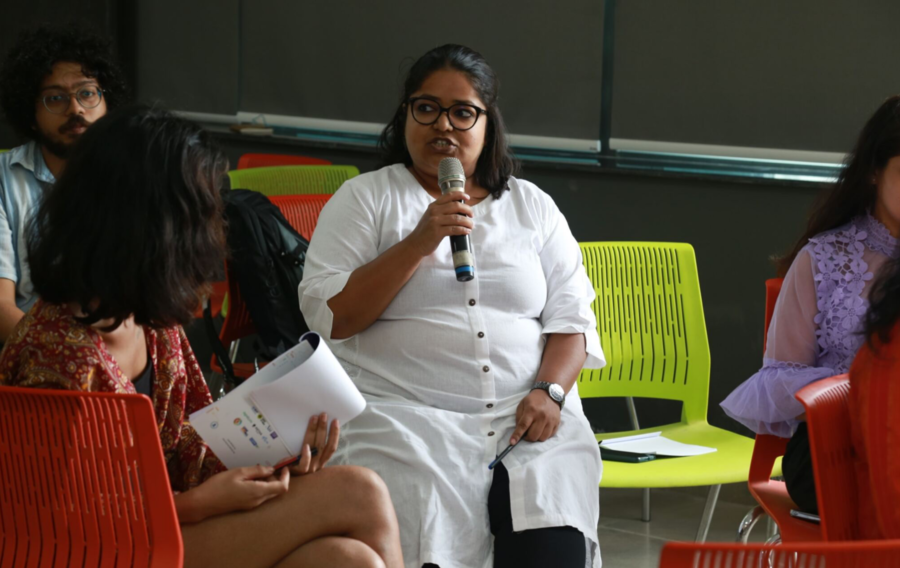
This workshop was designed as a masterclass. The investigation methods discussed in the workshop with activities enabled an understanding of how an EGM makes available evidence across different sources and in identifying the research gaps or dearth of evidence in any given research area. It focused on investigating methods and understanding how evidence, through activities, reveals gaps in research areas. Discussions covered steps, software, and the role of evidence in topics like gender, digital empowerment, trafficking, migration, and climate issues.
The workshop served as an initial step for researchers to learn the methodology. Audience questions centered on coding, methods, and research techniques, with speakers providing brief explanations and examples related to systematic review techniques.
Key outputs: The masterclass highlighted the need for visual data analysis to understand what research has already been done in the intersection of technology and health and where research is needed. This workshop provided the participants alternative ways to find a research gap and dedicate their efforts where it is required.
Panel Discussion: ‘Tech4Good-AgriTech’
MXR.world (Mixers across the World) is a hybrid media platform for showcasing innovations. The combination of physical events and online platforms delivers unique value to innovators, investors, and ecosystem enablers.
Panelists: Shalini Kala, Rural Development and Agriculture Specialist
Ashhar Farhan, Founder, Lamakaan
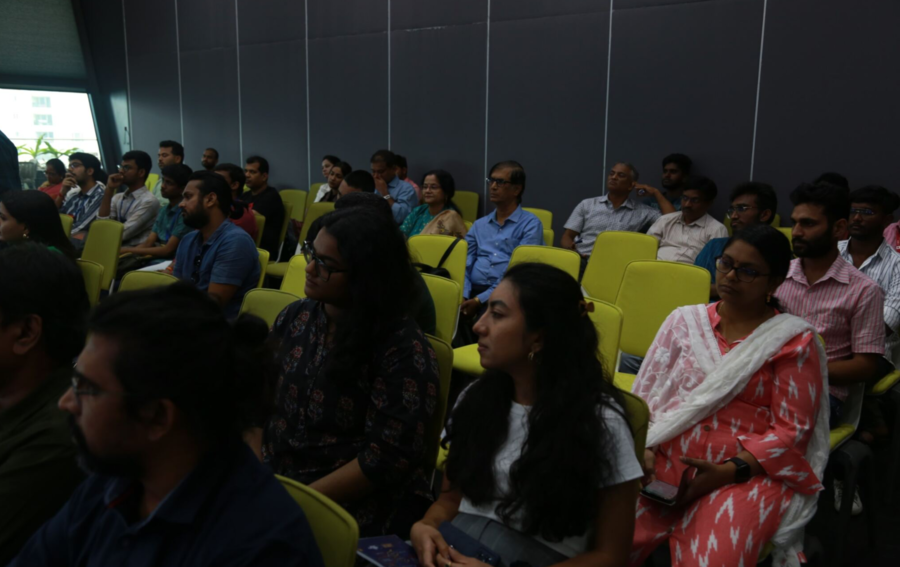
This exciting mixer brought together the brightest minds in AgriTech to explore how technology is revolutionizing agriculture and improving the lives of farmers and communities. Discovered cutting-edge solutions that address pressing agricultural challenges, promote sustainable practices, and empower digital citizens. It was an opportunity of networking, learning, being inspired by the tech for good movement and shaping the future of agriculture in India and beyond.
The session highlighted the main problems that challenge an AgriTech startup, emphasis was placed on the agriculture still being rain-fed and uncertain conditions. A start-up owner needs to keep these challenges in mind and anticipate them by putting in their research.
Key outputs: India’s diverse landscape and large populations creates an opportunity and possibility for a variety of crops. As people’s income and standard of living rises, there is a noticeable shift towards costlier goods like millet. In this ecosystem, people need to actively work towards bridging the gap between investors and agriculturalists to understand where good investment opportunities lie.
Lightening Talk: ‘We, the Digital Citizens of India’
By Harsh Mander, Writer and Peace Advocate
The Summit broke for a Networking Lunch, providing participants with the opportunity to engage and share insights. The afternoon continued with lightning talks, featuring thought-provoking topics such as ‘We, the Digital Citizens of India’ by Mr. Harsh Mander, where he spoke about the need to revisit the pledges of our constitution and Indian democracy through the digital lens.
Harsh Mander reflected on whether we have a sense of fraternity and mutual belonging in digital spaces. As our government is rapidly digitizing, we need to ask ourselves if we are excluding more people than we are including.
Lightening Talk: ‘Repair as Urban Development Ethic’
By Dr. Anant Maringanti, Geographer, Urban Expert and Director, Hyderabad Urban Lab
Hyderabad Urban Lab (HUL) Foundation is an interdisciplinary research and action initiative based in Hyderabad.
Anant Maringanti shared experiences related to housing challenges in Hyderabad. The focus is on the importance of repair and maintenance over constant innovation. The speaker highlights the lack of support for self-built housing and the shift from state-supported housing to market-driven solutions. The consequences of neglecting repair, such as inadequate infrastructure leading to health issues, are discussed. The talk emphasizes the need to prioritize repair in urban planning and policy considerations for sustainable development.
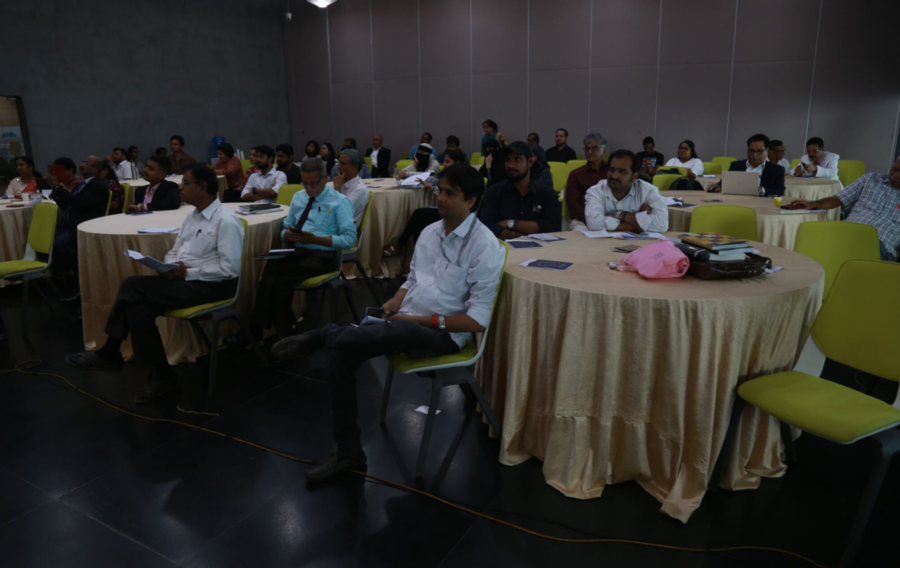
Lightening Talk: ‘Perceived Perception of Aadhar’
By Vineetha Venugopal, Digital Rights Researcher
In the talk, challenges in Aadhaar-based services were discussed. A major issue is fingerprint mismatch, reported by 60% of Service Providers (SPs), affecting the elderly, disabled, and children. The demand for streamlined allocation of ration, pensions, and scholarships without authentication barriers was emphasised. Delays in One-Time Passwords (OTPs) due to weak mobile connectivity, insufficient enrolment centers in rural areas, and long waiting times were highlighted as concerns. While 62% perceived reduced corruption with biometric checks, 13.16% noted bribery demands at enrolment centers. The positive impact of Aadhaar Enabled Payment System (AEPS) in rural areas, especially for vulnerable groups, was acknowledged for its convenience in eliminating travel and queues associated with traditional banking. AEPS through banking correspondents was deemed beneficial for illiterate individuals struggling with form-filling at banks.
Lightening Talk: ‘Internet Shutdowns: Selective banning of content on OTT platforms’
By Software Freedom Law Center (SFLC)
Speaker:
Syed Mohammed Haroon, Research Fellow, SFLC
This talk showed that India has lost 255.2 million dollars in six months of 2023 due to internet shutdowns. Just in the last year, India has had the highest number of shutdowns in the world even compared to the war-torn countries. Consequently, people lose their independence, learning opportunities, and livelihood. Supreme Court has emphasised that the government can only use internet shutdowns as a last-resort and hence we need to explore selective banning as an alternative.
Panel Discussion: ‘Is your News Lying to You?’
Parallel Room 1 (5th Floor) Launching the book ‘Truth and Deception in the Digital Age: Navigating the Culture of Misinformation: An Anthology’ curated by Osama Manzar and Dushyant Arora by Digital Empowerment Foundation
Panelists:
Osama Manzar, Founder-Director, Digital Empowerment Foundation
Harsh Mander, Writer and Peace Advocate
Shruti Jahagirdar, Author
Arun Teja, Author
Pankaj Pachauri, Founder and Editor-in-Chief, Go News
Pothuru Vamsi, PhD Scholar
Moderator: Dushyant Arora, Preamble Advisors
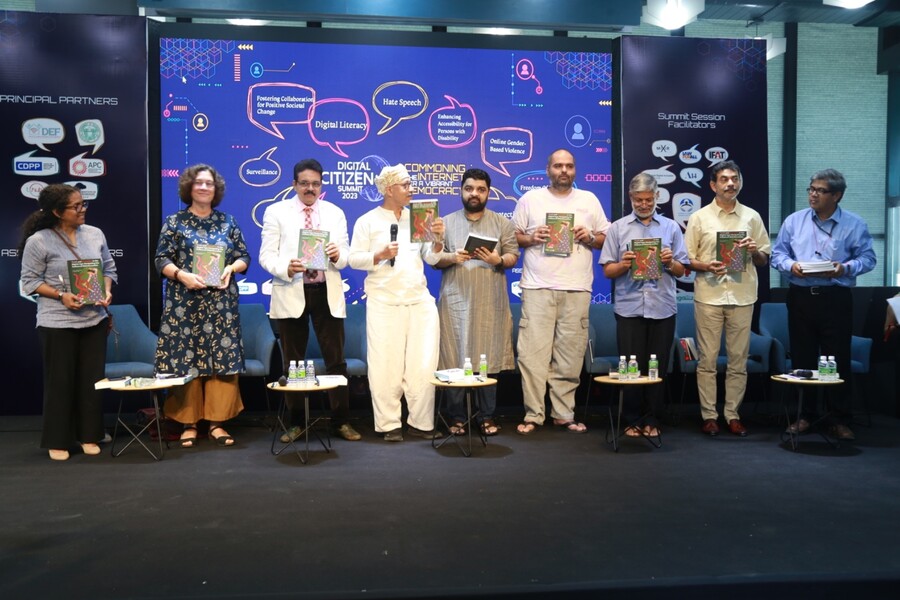
The session ‘Is Your News Lying to You?’ saw the launch of the book ‘Truth and Deception in the Digital Age: Navigating the Culture of Misinformation: An Anthology’ curated by Mr. Osama Manzar and Mr. Dushyant Arora.
The book has attempted to capture how misinformation has affected various factions of our everyday life ranging from mental health to our political systems and overall threatens our democracy. Fake news online has real consequences that translate into our offline lives for example the 2017 WhatsApp killings. The sessions helped participants understand that the biases we hold in offline lives in our society and communities, further seeps into our online worlds as well. The session also quoted the roots of misinformation in the legitimacy of the country of Palestine in the Parliament.
Key outputs: Fake misinformation feeds into our existing prejudices and hence while we focus on our online world, we also need to address the deeper problems in our civilization. Tech giants like Apple have been able to build empires due to profits earned due to such misinformation.
Panel Discussion: ‘Let’s Account for DPDP’
By Mazdoor Kisan Shakti Sangathan (MKSS) and Social Accountability Forum for Action and Research (SAFAR)
Panelists:
Mr. Pranvendra, Mr. Khush, Ms. Rakshita, Mr. Naurat, and Mr. Chatar Singh.
MKSS is a People’s Organisation and part of the growing Non-party political process in India. The MKSS works with workers and peasants in the villages of Central Rajasthan.
SAFAR is a collective of activists, researchers, and development practitioners. We work at the interface of the state, law, and society to deepen institutions and practices of social accountability and improve access to welfare rights.
The speaker emphasizes the importance of public information, particularly related to government spending and resource allocation. They argue for transparency to prevent misuse of public funds and highlight the need for public access to information, citing instances where this has exposed corruption. Additionally, they discuss challenges faced by the underprivileged, such as difficulties accessing digital systems for services like pensions. The speaker touches on the privacy debate, advocating for a balance that prioritizes public interest over individual privacy in matters of public concern. They also raise concerns about data security and government accountability.
The session also invited beneficiaries who shared their experience of being at the receiving end of the digital architecture and highlighted the challenges that they face.
Key outputs: The session added to the existing discourse on the conflict between the Right to Information Act and the Digital Personal Data Protection Act that amends the first Act taking away the citizen’s right to know where their money is being spent and if government spending is being allocated as promised.
Panel Discussion: Rooting for Change Through Internet
By Aadiwasi Janjagruti
Aadiwasi Janjagruti is an initiative by Ulgulan for Social Change Foundation, which is working on Social Justice, awareness, and entitlements in Dhadgaon block of Nandurbar Maharashtra through mobile video films.[1] It allows tribal people to highlight their issues in Pawari, Bhilori and Aahrani language by using citizen Journalism.
Speakers:
Nitesh Bhardwaj, Co-founder, Aadiwasi JanJagruti
Rakesh Pawara, Co-founder, Aadiwasi JanJagruti
The session commenced with an introduction of Aadiwasi Janjagruti, an initiative by the Ulgulan for Social Change Foundation, actively engaged in promoting social justice and awareness in Maharashtra’s Dhadgaon block. Speakers detailed their efforts at the grassroots level, emphasizing the critical role of the local community in nurturing leaders and the significance of hyperlocal journalism for positive transformations.
During the Q&A session, key questions were addressed. One inquiry focused on the organization’s future trajectory, to which the speakers clarified their commitment to development while acknowledging the freedom of volunteers to contest elections. Another question explored the community’s trust in the organization, which the speakers attributed to active local participation. In response to a query about financial stability, the speakers shared the organization’s self-sustainability over the past five years and recent support from sources like the Google News Initiative and APPI, contributing to ongoing operations and growth.
Key outputs: The session highlighted Aadiwasi Janjagruti’s strong focus on development, supporting volunteers in cultivating ethical leadership. Community trust is attributed to active local participation. Financially self-sustainable for five years, recent support from Google News Initiative and APPI adds stability. The speakers emphasised hyperlocal journalism’s impact on local issues and misinformation, affirming the organization’s commitment to positive social change through media.
Panel Discussion: Your Mirror Speaking Against You, Search and Seizure of Electronic Devices
By Software Freedom Law Center
SFLC is a donor supported legal services organization that brings together lawyers, policy analysts, students, and technologists to protect freedom in the digital world. SFLC.IN promotes innovation and open access to knowledge by helping developers make Free and Open-Source Software, protect privacy and civil liberties for citizens in the digital world by educating and providing free legal advice The main objective of this intervention is to help policy makers make informed and just decisions with the use and adoption of technology.
Panelists:
Adv. Prasanna S, Advocate on Record, Founder and Trustee at
Article 21 Trust
- Q. Maqbool, RTI Activist and FTR Activist
Moderator:
Syed Mohammed Haroon, Research Fellow, SFLC
In discussions on digital rights, speakers addressed concerns about potential law enforcement overreach in electronic device searches. The lack of transparency raised worries about privacy violations. The key takeaway was the need for a balanced legal framework, considering national security and individual privacy, with clear guidelines and oversight for search and seizure powers.
During Q&A, the audience sought insights into real-life scenarios of electronic device searches and safeguards. The panel stressed the necessity for improved frameworks outlining safeguards and rights, providing a checklist for individuals to preserve their rights.
Key outputs: The growing prevalence of electronic devices and the extensive data they store presents a notable challenge for law enforcement agencies. It highlights the importance of establishing clear and consistent legal guidelines for the search and seizure of electronic devices. To address this, law enforcement agencies should develop standardised procedures for these operations.
Museum of Digital Society: A VISUAL STORYTELLING SESSION hosted by Digital Empowerment Foundation & Showcasing digital and technological development through digital tools in India through the T-Works Expo
The late afternoon featured a visual storytelling session at the ‘Museum of Digital Society: Story of Digital Development in India,’ hosted by the Digital Empowerment Foundation (DEF). The Museum of Digital Society aims to serve as a testament to the transformative narrative of DEF’s 22-year journey of digital empowerment and digital development in India.
The Museum of Digital Society served as an interactive space, chronicling the transformative journey of the Digital Empowerment Foundation (DEF) over the past two decades. Through diverse media, including publications, digital innovations, ground stories, archival documents, and tablets, the museum aimed to provide a comprehensive understanding of the impact of digital inclusion in 24 states and 135 districts across India. The primary objective was to commemorate and celebrate DEF’s 20-year journey, showcasing key milestones, projects, and initiatives that highlighted DEF’s commitment to bridging the digital divide and empowering marginalised communities.
The museum served as an educational hub, offering insights into the power of digital inclusion through interactive exhibits, multimedia presentations, and real-life success stories, inspiring individuals, organizations, and policymakers to contribute actively to the mission of digital empowerment.
During the Digital Citizen Summit 2023, the Digital Empowerment Foundation along with Software Freedom Law Centre (SFLC), Centre for Development Policy and Practice (CDPP), and Internet Freedom Foundation (IFF) also showcased their work through knowledge products, publications, and experiential presentation for the audience.

The day concluded with a showcase of digital and technological development through the T-Works Expo. T-Works is India’s largest fully integrated hardware prototyping center, an initiative of the Government of Telangana, aims to create and celebrate a culture of hobbyists, makers, and innovators in India; who explore and experiment without the fear of failure. This was followed by the presentation of startups and technology innovations at by T-Hub.
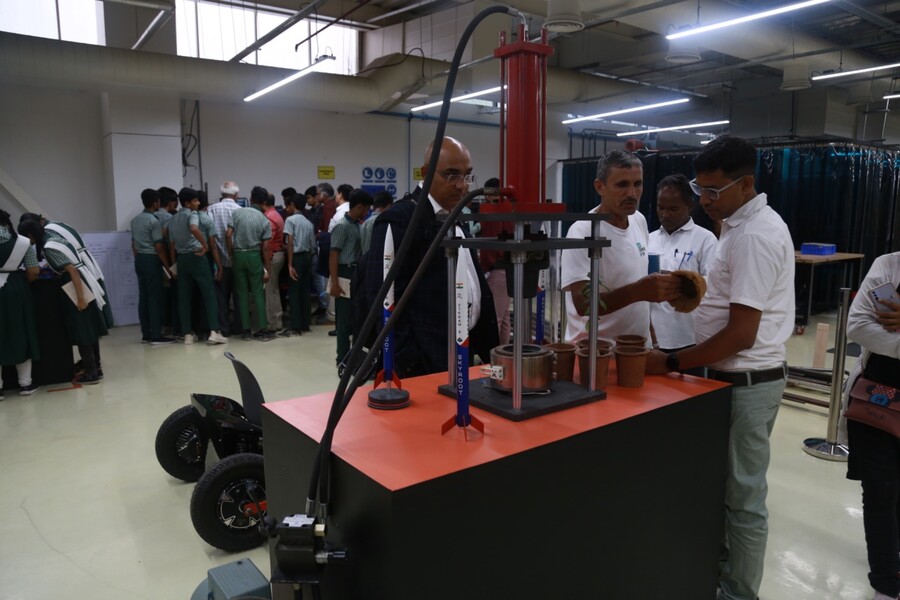
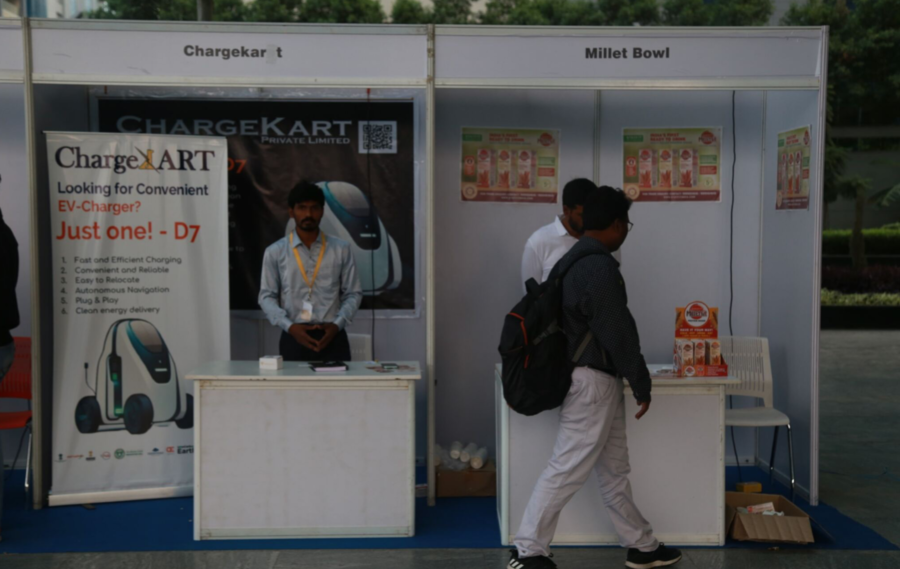
Panel Discussion: ‘Digital Rights & Wrongs: Dialogue with a Sufi on Society’s Quest to Digital Culture Conversation
Panelists:
Mr. Saeed Akhtar Mirza, Indian Screenwriter and Director
Ms. Elahe Hiptoola, Indian Film Producer and Former Actress, and
Mr. Osama Manzar, Founder & Director, Digital Empowerment Foundation.
The evening took a cultural turn with ‘Digital Rights & Wrongs: Dialogue with A “Sufi” on Society’s Quest to Digital Culture’. This informal, artistic, and cultural dialogue explored the evolution of digital technologies and their impact on society, culture, and the arts, particularly in the context of cinema and films.
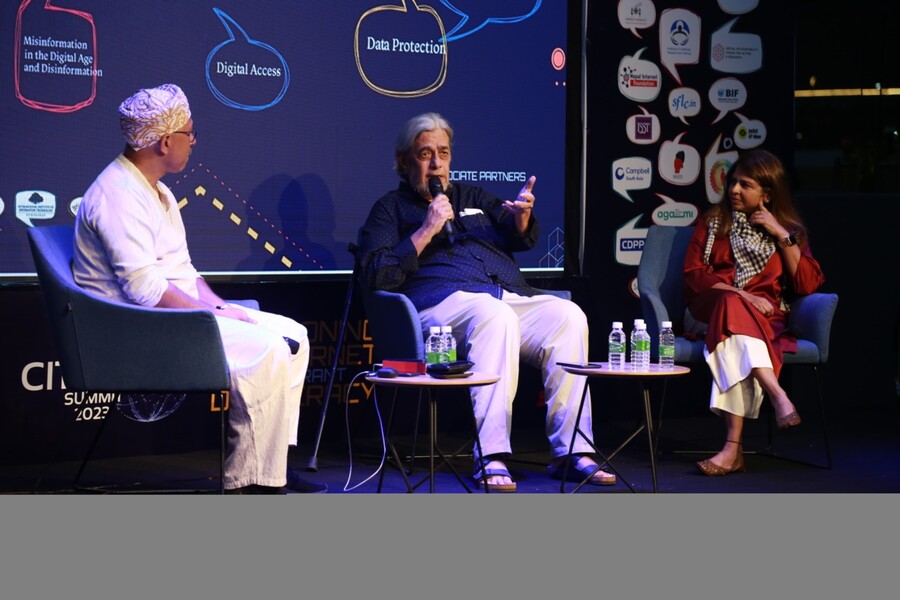
The conversation featured Mr. Saeed Akhtar Mirza, acclaimed for films like Naseem, Salim Langde Pe Mat Ro, and more, bringing a unique perspective to Digital Citizen Summit. He authored the novel, “Ammi: Letter to A Democratic Mother”. He was joined by Ms. Elahe Hiptoola, Indian Film Producer and Former Actress, and Mr. Osama Manzar, Founder & Director, Digital Empowerment Foundation.
The conversation delved into the misuse of digital platforms as administrative tools for control and governance through data. Mirza raised alarms about cultural shifts tied to digital adaptation and emphasised the plight of those digitally marginalised. Coordinating through WhatsApp, the discussion drew parallels between digital interactions and the platform’s susceptibility to spreading false narratives, propagandist politics, and disinformation, contributing to the increasing toxicity of the digital space.
The Summit concluded with a Cultural Folk Performance and Dinner, featuring Marsukola Kalavathi and troupe who sang about misinformation, providing a delightful end to a day filled with insights, discussions, and cultural celebrations.








